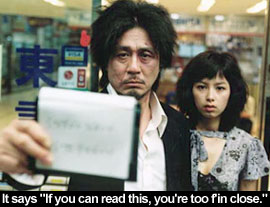OLDBOY
****/****
starring Choi Min-sik, Yu Ji-tae, Kang Hye-jeong, Ji Dae-han
screenplay by Hwang Jo-yun, Lim Chun-hyeong, Park Chan-wook
directed by Park Chan-wook
THE BALLAD OF JACK AND ROSE
**½/****
starring Daniel Day-Lewis, Catherine Keener, Camilla Belle, Paul Dano
written and directed by Rebecca Miller
by Walter Chaw
 "I, the Wrath of God, will marry my own daughter, and with her I will found the purest dynasty the earth has ever seen." -Aguirre, Aguirre: The Wrath of God
"I, the Wrath of God, will marry my own daughter, and with her I will found the purest dynasty the earth has ever seen." -Aguirre, Aguirre: The Wrath of God
A Greek tragedy, an opera, a showcase for South Korean cinema, and one exhilaratingly sick piece of cinema, Park Chan-wook's Oldboy is like the three plays of the "Oresteia" distilled into one pure, malevolent, volatile essence. It's vengeance served hot and perverse like a Medeaen stew, a story of settling scores old enough to be archetype married to sounds and images so invasively intimate that the process of working through the film is a little like getting physically violated. It's vital stuff, this Oldboy, its very title suggesting an ironic superhero alter ego–sketching anti-hero Oh Dae-Su (Choi Min-sik) as a fright-mask of arrested development, a child raging against its prematurely-aged body. We meet him one drunken night as he's bailed out of a night in the tank only to spend the next fifteen years in a solitary-confinement prison cell masquerading as a chintzy backwater motor inn room. He watches TV there, mostly cable news and its horrorshow of buildings and bridges falling, with periodic gassings allowing his anonymous captors to stitch up his wrists and gather biological mementos to leave at the scenes of crimes he didn't commit. When he's finally released, it's not clear if he's been falsely led to believe that he's free, if he's escaped by the graces of an ingenious plan involving a chopstick and a lot of time, or if he's died and this is his demented brain's oxygen-starved fantasy of what he woulda done to the lousy sons o'bitches if only he'd lived.
